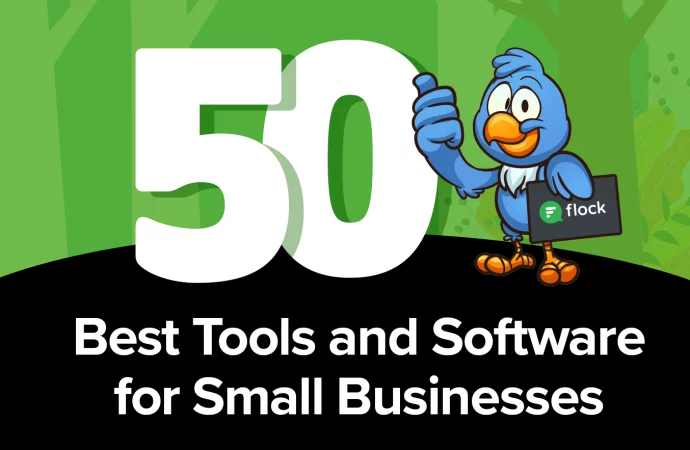Introduction Are you a small business owner looking to streamline your operations and boost productivity? You’re in luck! We’ve compiled a list of the essential 50 software applications that every SMB needs. From accounting to marketing, these tools will help you save time, cut costs and grow your business. But with so many options out
Introduction
Are you a small business owner looking to streamline your operations and boost productivity? You’re in luck! We’ve compiled a list of the essential 50 software applications that every SMB needs. From accounting to marketing, these tools will help you save time, cut costs and grow your business. But with so many options out there, how do you know which ones to choose? Don’t worry – we’ve done the research for you. Read on to discover our top picks and find out how they can benefit your business.
What are the essential 50 software applications every small business needs?
When it comes to running a small business, having the right software can make all the difference. But with so many options out there, how do you know which ones to choose? Here are some of the essential 50 software applications that every SMB needs:
- Firstly, accounting software is crucial for managing your finances and keeping track of expenses. QuickBooks, Xero and FreshBooks are popular choices for small businesses.
- Secondly, project management tools such as Trello or Asana can help you stay organized and collaborate with team members more effectively.
- Thirdly, customer relationship management (CRM) software like Salesforce or HubSpot allows you to manage customer interactions and improve sales performance.
- Fourthly, social media scheduling apps like Hootsuite or Buffer can save you time by allowing you to schedule posts in advance across multiple platforms.
- Email marketing tools such as Mailchimp or Constant Contact allow you to create professional looking campaigns and reach your target audience more effectively.
These are just a few examples of the essential 50 software applications that every SMB should consider investing in. By choosing the right tools for your business needs, you’ll be able to streamline processes, improve productivity and ultimately grow your bottom line.
How do you find these applications?
Finding the right software applications for your small business can be overwhelming, especially with so many options available online. But don’t worry, there are several ways to narrow down your search and find the best applications that fit your needs.
Firstly, it’s important to identify what specific areas of your business need improvement or automation. Do you need help with accounting and finance? Marketing and sales? Human resources and payroll? Once you’ve identified these areas, you can start searching for software applications that specialize in those fields.
Secondly, ask for recommendations from other small business owners or industry experts. Joining online communities or attending networking events can also provide valuable insight into which software applications have worked well for others in similar industries.
Thirdly, read reviews from real users on websites like Capterra or Software Advice to get an idea of how well each application performs in terms of functionality, usability and customer support.
Take advantage of free trials offered by many software companies before committing to a full purchase. This allows you to test out the application’s features firsthand before making any financial commitments.
What are the key features of each application?

Image by: Yandex.com
When it comes to the essential software applications that every small business needs, each one has its unique features and capabilities. Accounting software, for example, should have features such as invoicing, expense tracking, and financial reporting. Marketing automation tools should offer email marketing campaigns management, social media scheduling options and analytics reports.
For project management software solutions, key features include task assignment and tracking of progress across teams or departments. Additionally, file sharing among team members can be a helpful feature when collaborating on projects or presentations.
Customer relationship management (CRM) systems should provide contact information storage with notes about interactions made with each customer. It is also convenient when these systems integrate with other company apps like email clients or accounting software to share data efficiently.
Online payment processing apps are now necessary for many businesses which use e-commerce platforms to sell their products or services online quickly. These types of apps require secure transactions encryption technology alongside merchant account setup assistance.
Finding the right mix of essential applications requires research into what tasks you need help within your business processes daily so that you don’t end up paying extra for unnecessary add-ons in any particular app chosen at the beginning.
What do the reviews say about each application?
When it comes to choosing software applications for your small business, reading reviews can be incredibly helpful. Reviews allow you to hear from real users and get a sense of how the software performs in different scenarios.
One thing to keep in mind when researching reviews is that not all reviews are created equal. Some may be biased or fake, while others may focus on issues that aren’t relevant to your business. It’s important to read a variety of reviews from different sources and use your judgment when evaluating their credibility.
Some common themes that come up in software application reviews include ease of use, reliability, customer support, and value for money. Many reviewers also mention specific features they like or dislike about the software.
Reading reviews can give you valuable insights into what it’s really like to use each software application. Just remember to take them with a grain of salt and consider multiple perspectives before making any decisions.
How much does each application cost?
Small businesses need to invest in software applications that can help them manage their operations efficiently. However, before making any purchase decision, it’s important to consider the cost of each application. Some applications may come with a hefty price tag, while others are more affordable.
When researching software applications for your small business needs, keep in mind that some providers offer subscription-based pricing models. This means you’ll have to pay a monthly or yearly fee to access the software and its features. On the other hand, some providers may offer one-time payment options for lifetime access.
It’s also important to note that pricing might vary depending on the number of users accessing an application simultaneously. So if you have a team working on specific tasks using an application like project management tools or customer relationship management (CRM) systems, you may want to opt for a provider offering volume discounts.
Another thing to consider when evaluating costs is whether there are any additional fees involved such as installation charges or training expenses incurred by hiring professionals who will train your employees how to use the new software system effectively.
Every business has different needs and budgets when it comes down purchasing essential software applications. It’s always wise for SMBs owners and managers ask about upfront costs so they won’t be surprised later down the road by hidden expenses related with acquiring new technology solutions tailored towards their organization’s growth objectives and priorities
Which applications should your business buy first?
When considering which software applications to purchase for your small business, it’s important to prioritize based on your specific needs. Your first purchases should be the applications that will have the most immediate impact on improving productivity and streamlining processes.
One essential application for any small business is accounting software. This will allow you to easily manage finances such as invoicing, budgeting, and payroll. Another priority should be a project management tool, which can help keep tasks organized and ensure deadlines are met.
In addition to these core applications, consider investing in customer relationship management (CRM) software. This can help improve communication with clients and streamline sales processes. Marketing automation tools are also key for businesses looking to expand their reach through targeted campaigns.
Cybersecurity software should not be overlooked as cyber threats continue to rise in frequency and complexity. Investing in antivirus software or firewalls can protect sensitive information from potential breaches.
Remember that every small business has unique needs depending on its industry and size. Take time to assess what areas of your business need improvement before making any major purchases.
Conclusion
In today’s digital age, software applications have become essential tools for small businesses to operate effectively and efficiently. From accounting to marketing, there are a plethora of options available that can help streamline processes and increase productivity.
By taking the time to research and identify the key features of each application, small business owners can make informed decisions about which ones will best meet their needs. It’s also important to consider factors such as cost and user reviews before making a purchase.
While it may be overwhelming at first glance, investing in these 50 essential software applications can pay off in the long run by saving time and increasing revenue. By prioritizing which applications your business needs most, you’ll be able to start reaping the benefits sooner rather than later.
Incorporating software applications into your workflow is no longer an option but a necessity for SMBs looking to thrive in today’s competitive market. With so many options available at our fingertips, it’s up to us as business owners to take advantage of these powerful tools and use them wisely.

















Leave a Comment
Your email address will not be published. Required fields are marked with *